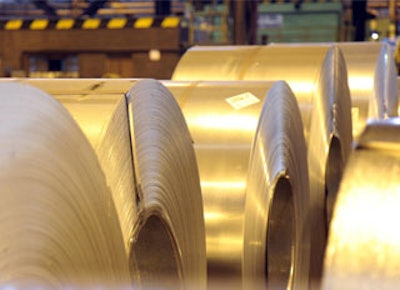
AMSTERDAM (AP) — Charges related to its ailing European business and a drop in the value of its assets saw ArcelorMittal SA, the world's largest steel maker, post a near $4 billion loss for the fourth quarter.
The company, based in Luxembourg, said Wednesday its net loss widened to $3.99 billion (€2.94 billion) from $1 billion in the same period a year ago. Sales fell 14 percent to $19.3 billion, as both prices and volumes declined year on year.
The loss included $4.8 billion in charges and write-downs related to its European business, notably the idling of plants in Madrid and Florange, France, and the decision to close a plant in Liege, Belgium. The company has clashed with governments and labor unions over the facilities and remains cautious about its European business this year despite improvements elsewhere.
"Although we expect the challenges to continue in 2013, largely due to the fragility of the European economy, we have recently seen some more positive indicators," said the company's founder and chief executive, Indian industrialist Lakshmi Mittal.
That, together with cost cutting measures "are expected to support an improvement in the profitability of our steel business this year," he said.
He forecast that steel shipments would grow by 2-3 percent in 2013 and operating profit — which was $7.1 billion for the full year 2012, a 30 percent fall from 2011 — would show at least some unspecified amount of growth in 2013.
Investors appeared encouraged by the relatively upbeat forecast and the company's shares rose 1.7 percent to €12.645 in early trading in Paris.
Alongside the results, the company issued a second press release, apparently intended to underline the divergent fortunes of Europe and the rest of the world since the global financial crisis that began in 2007.
Since then, global finished steel consumption has risen 16 percent, with China accounting for the bulk of the growth. In North America, consumption fell dramatically around the time of the financial crisis in late 2008, but quickly recovered and is now only about 8 percent lower than in 2007 and on an upward slope.
Europe initially recovered along with North America, but has since fallen away again as austerity measures hurt demand. Consumption is now nearly 30 percent lower than it was in 2007 and a decline appears to be accelerating.
The company has obvious reasons for wanting to underline the difficulties it faces in Europe.
At Florange, the company initially wanted to close two blast furnaces, but after protests that led one politician to threaten to nationalize the site, the company eventually struck a deal with French Prime Minister Jean-Marc Ayrault to retrofit the furnaces instead. It's investing €180 million to install systems that recycle blast gases and capture CO2. Six hundred jobs were saved.
In Liege, a dispute over 1,300 proposed layoffs continues. Clashes between striking workers and police left two officers injured as recently as Jan. 29.


















